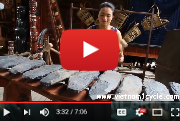|
Home
|
Jun 15, 2020
This week’s themeWords made with combining forms This week’s words lithophone aischrolatreia henotheism hyponym geratology 
A lithophone in Vietnam
Previous week’s theme Words having origins in rivers A.Word.A.Day
with Anu GargA language is democracy in action. If you coin a word, you can use it, in your texting, love letters, PhD thesis, even in office memos. Sure, there are some “dictatorships” in the language world, but they don’t work well. There are language academies policing what words can and cannot be used, prescribing native* words over those adopted from other languages, but people pay as much attention to them as teenagers to moms. A language, like a relationship, works better when it grows organically, not straitjacketed by rules and conditions. Language and its speakers do what they want to do -- no one else need have a say in it. So how do you go about coining a word? You can coin a completely made-up word or you can use existing components -- combining forms -- to assemble a new word. What are combining forms? You can think of them as Lego (from Danish, leg: play + godt: well) bricks of language. As the term indicates, a combining form is a linguistic atom that occurs only in combination with some other form which could be a word, another combining form, or an affix (unlike a combining form, an affix can’t attach to another affix). This week we’ve gathered these 10 combining forms and will feature five words made from them: litho- (stone), aischro- (shameful or ugly), heno- (one), hypo- (under), gerat- (old age) and -phone (sound), -latreia (worship), -theism (belief in god), -nym (name), and -logy (study). What words can you come up with and how would you define them? There 5x5 = 25 total possibilities. Share them below or email words@wordsmith.org. *The word “native” doesn’t mean much for a living language. All languages borrow from each other and that’s one of the ways they grow. The one that doesn’t is a dead language. lithophone
PRONUNCIATION:
MEANING:
noun: Any of various musical instruments in which sound is produced by striking pieces of stone.
ETYMOLOGY:
From Greek litho- (stone) + -phone (sound). Earliest documented use: 1889.
NOTES:
If you have been thinking about starting a rock band, well, this is
one way to go about it. For inspiration, check out this video:
Lithophones of Gobustan.
USAGE:
“The lithophone, which consists of five, 130-pound pieces of marble
and mallets, are designed by Graubner in Herrischried, Germany.” Mark Billings; With Built-In Instruments, Park Truly a Musical Destination; Daily Herald (Arlington Heights, Illinois); Jun 3, 2007. A THOUGHT FOR TODAY:
To a father growing old, nothing is dearer than a daughter. -Euripides,
playwright (c. 480-406 BCE)
|
|
Subscriber Services
Awards | Stats | Links | Privacy Policy
Contribute | Advertise
Awards | Stats | Links | Privacy Policy
Contribute | Advertise
© 1994-2025 Wordsmith